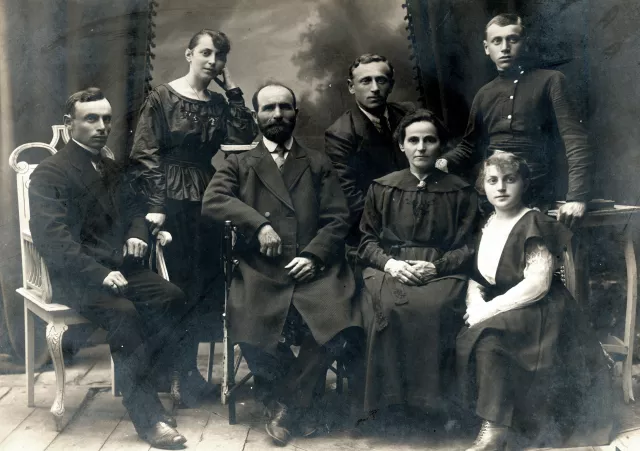Chaim Grienblatt’s family
This is the family of my maternal great grandfather, Khaim Grienblatt.
Great grandfather is sitting second from left, wearing a beautiful long frock coat, buttoned up or lapped over to the left (it must have been allowed at that time); near him is great grandmother (I do not know her name) and their children: utmost to the left is son Iosif, utmost to the right is daughter Feiga; from left to right are standing: daughter Frida and sons Boris and Solomon.
They are wearing secular clothes and it seems to me, they are dressed up (except for Solomon, perhaps). My grandmother is not in the picture, she had already moved to Ukraine by then. I do not what occasion this picture was taken on, but I know that it was taken in Orsha in 1915.
I know that my great grandfather Khaim Grienblatt and great grandmother were born in Belarus, not far from Orsha [Orsha is a town in Vitebsk region, located in the North-Eastern part of the Belarus Republic, 700 km to the South of St. Petersburg].
Their children were also born there: sons Iosif, Boris and Solomon and daughters Gitl, Feiga and Frida. Gitl Khaimovna Grienblatt, my maternal grandmother, was born in 1893.
Grandmother's parents lived in Orsha almost all their lives. I was told that they were religious people observing traditions: kosher, Sabbath, celebrating traditional holidays and attending the synagogue. In 1941 when the Great Patriotic War broke out, they managed to evacuate to the Sverdlovsk region in the Urals.
At the very last moment before the Germans arrived [Sverdlovsk region was set up in 1934 in the Middle Urals, about 2,000 km to the East of St. Petersburg; in 1930-1940s large defense, machine-construction and metallurgical plants were build there, which played a very important part during the years of the Great Patriotic War].
They were provided lodging in a village. They could not work in the kolkhoz according to their age and health, that is why they lived very poorly. They died of starvation as a matter of fact in 1942. 1 They were buried there, in a common rural cemetery.














